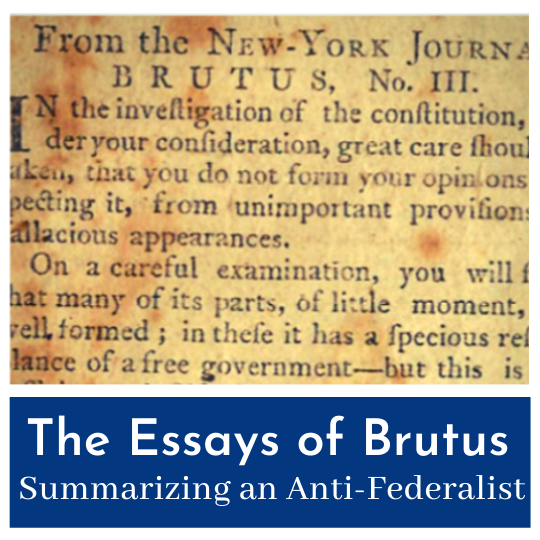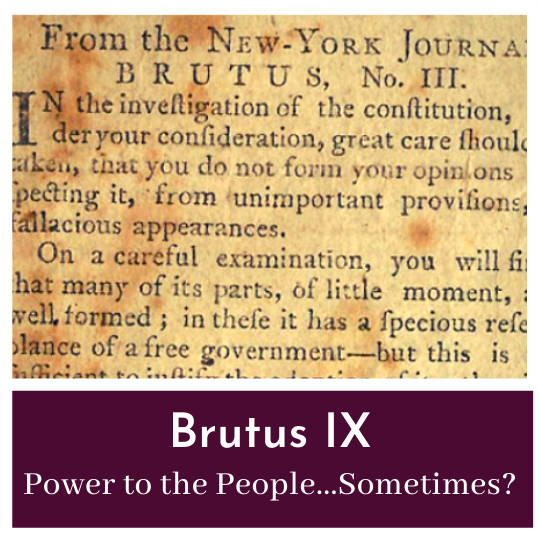The Essays of Brutus: An Overview
A review of the arguments of a leading Anti-Federalist.
The Essays of Brutus
Between October 1787 and April 1788, eighteen essays appeared in the New York newspapers criticizing the US Constitution and pleading for its rejection during the Ratification Debates.
The Anti-Federalist author, known as Brutus, was probably Constitutional Convention Delegate Robert Yates.
Over the last several months I have read and reviewed all of these Essays and here have listed in brief the main idea behind each.
Click on a heading to read the full article.
Brutus I
Brutus begins the series outlining his opinion that the States will be consolidated under the Constitution and specifically points out the open-endedness of the Necessary and Proper Clause.
Brutus II
Brutus attacks the Constitution for its lack of a Bill of Rights.
Brutus III
Brutus criticizes representation under the Constitution. In addition to the Three-Fifths Clause, Brutus notes that there would be less Representatives in the Federal Congress than the total of those under the separate States.
Brutus IV
Brutus proposes that the wealthy would secure control of the United States by using their power to determine the time and place of elections to make voting inconvenient or impossible for average citizens.
Brutus V
Brutus suggests that the Constitution’s Necessary and Proper Clause allowed Congress to make literally any law.
Brutus VI
Brutus predicts that the unlimited power of taxation would put Congress in a position to tax the States out of existence.
Brutus VII
Brutus goes into detail about how to define limits on Congress’ power of taxation.
Brutus VIII
Brutus criticizes the Constitution’s ability to raise standing armies and procure a national debt.
Brutus IX
Brutus responds directly to Alexander Hamilton’s Federalist #24 (which itself attacked Brutus VII) specifically rebutting the idea that a standing army could be controlled by the people.
Brutus X
Brutus reviews the history of standing armies and the suppression of Shays’ rebellion to verify his previous point that standing armies are bad and unnecessary.
Brutus XI
Brutus turns his attention to the Supreme Court. Specifically, he is concerned that the Judges can determine the ‘spirit’ of the Constitution as opposed to simply interpreting the text itself.
Brutus XII
Brutus expects Congress to be weary of the Supreme Court’s opinion when making laws, giving the Judicial Department an unspoken power over the Legislature.
Brutus XII (Continued)
Brutus finds that to ‘establish justice’ the Federal Courts will slowly take power from the State Courts, eventually making the States themselves obsolete.
Brutus XIII
Brutus determines that giving individuals the power to sue States in Federal Court, coupled with the aforementioned taxation, the States would quickly be bankrupted and eliminated.
Brutus XIV
Arguably the most important Essay of Brutus, its contents led directly to part of the 5th and all of the 6th Amendments to the Constitution in the Bill of Rights.
Brutus XIV (Continued)
Brutus makes the assessment that a new court system is unnecessary because the contemporary system already works.
Brutus XV
Brutus claims the Constitution has taken all the wrong parts of Britain’s judicial system. He argues Judges should not be appointed for life and the House of Representatives should review the Court’s work.
Brutus XVI
Brutus criticizes the Senate because of its lengthy terms and participation in every branch of government.
Thanks for reading!
Next week we begin the Letters of Cato, so make sure you subscribe to the email list.
You can also support this site on Patreon by clicking here.





